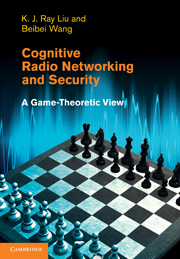Book contents
- Frontmatter
- Contents
- Preface
- Part I Cognitive radio communications and cooperation
- 1 Introduction to cognitive radios
- 2 Game theory for cognitive radio networks
- 3 Markov models for dynamic spectrum allocation
- 4 Repeated open spectrum sharing games
- 5 Pricing games for dynamic spectrum allocation
- 6 A multi-winner cognitive spectrum auction game
- 7 Evolutionary cooperative spectrum sensing games
- 8 Anti-jamming stochastic games
- 9 Opportunistic multiple access for cognitive networks
- Part II Resource awareness and learning
- Part III Securing mechanism and strategies
- References
- Index
7 - Evolutionary cooperative spectrum sensing games
from Part I - Cognitive radio communications and cooperation
Published online by Cambridge University Press: 06 December 2010
- Frontmatter
- Contents
- Preface
- Part I Cognitive radio communications and cooperation
- 1 Introduction to cognitive radios
- 2 Game theory for cognitive radio networks
- 3 Markov models for dynamic spectrum allocation
- 4 Repeated open spectrum sharing games
- 5 Pricing games for dynamic spectrum allocation
- 6 A multi-winner cognitive spectrum auction game
- 7 Evolutionary cooperative spectrum sensing games
- 8 Anti-jamming stochastic games
- 9 Opportunistic multiple access for cognitive networks
- Part II Resource awareness and learning
- Part III Securing mechanism and strategies
- References
- Index
Summary
Cooperative spectrum sensing has been shown to be able to greatly improve the sensing performance in cognitive radio networks. However, if cognitive users belong to different service providers, they tend to contribute less to sensing in order to increase their own throughput. In this chapter, we discuss an evolutionary game framework to answer the question of “how to collaborate” in multiuser decentralized cooperative spectrum sensing, because evolutionary game theory provides an excellent means to address the strategic uncertainty that a user/player may face by exploring different actions, adaptively learning during the strategic interactions, and approaching the best response strategy under changing conditions and environments using replicator dynamics. We derive the behavior dynamics and the evolutionarily stable strategy (ESS) of the secondary users. We then prove that the dynamics converge to the ESS, which makes possible a decentralized implementation of the proposed sensing game. Employing the dynamics, we further develop a distributed learning algorithm so that the secondary users approach the ESS solely on the basis of their own payoff observations. Simulation results show that the average throughput achieved in the proposed cooperative sensing game is higher than that in the case in which secondary users sense the primary user individually without cooperation. The proposed game is demonstrated to converge to the ESS, and to achieve a higher system throughput than that of the fully cooperative scenario, in which all users contribute to sensing in every time slot.
- Type
- Chapter
- Information
- Cognitive Radio Networking and SecurityA Game-Theoretic View, pp. 177 - 199Publisher: Cambridge University PressPrint publication year: 2010



